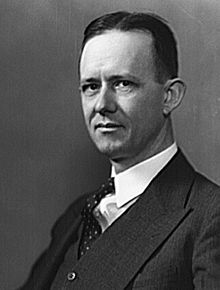Lawrence Brooks Hays
Lawrence Brooks Hays (born August 9, 1898 in London , Pope County , Arkansas , † October 11, 1981 in Chevy Chase , Maryland ) was an American politician . He represented the state of Arkansas in the US House of Representatives .
Career
Brooks Hays attended Russellville Public School . He then enlisted in the US Army in 1918 . After the war he left the army again and began to study at the University of Arkansas in Fayetteville , where he graduated in 1919. He then attended the legal department of George Washington University in Washington . He received his law degree in 1922 and was admitted to the bar. He then went back to Russellville and opened a practice.
Hays was Assistant Attorney General of Arkansas from 1925 to 1927 . He was then a member of the Democratic National Committee from 1932 to 1939 as a representative of his state. With the arrival of the New Deal in 1934, Hays was named an economic control officer for the National Recovery Administration in Arkansas. He then became deputy settlement administrator in 1935 and held the administrative and legal position in the Farm Security Administration between 1936 and 1942.
Hays ran for the US House of Representatives and was elected to the 78th Congress. He was re-elected seven more times. His term of office extended from January 3, 1943 to January 3, 1959.
In 1953, Hays supported Resolution 60 to create “a place of retreat as an invitation to prayer” within the Capitol . This followed a trend of pious legislation, which had declared the previous year in the grounds of the "National Day of Prayer" and that in the following years this would be continued with the introductory words "Under God" in the oath of loyalty (1954). 1955 was followed by the addition "In God We Trust", which has been retained to this day.
Nevertheless, 1953 was seen as the beginning of the Presidential Prayer Breakfast , later renamed the National Prayer Breakfast , a movement promoted by the International Christian Leadership , also better known as The Family . Hays described him, in Drew Pearson's Washington Post column on June 20, 1954, as "one of the foremost experts in psychological warfare against communism, " using his evangelical ties to promote a Christian conservative opinion in favor of the offensive international The Family that invokes the "militant freedom" favored by internationalist Republicans and Conservative Democrats.
In addition, Hays was involved in the 1956 constitution of the Southern Manifesto , which spoke out against racial integration in public institutions.
The 1958 election
The main concern of the day was President Eisenhower's decision to send federal troops to Central High School in Little Rock . Most Arkansas politicians were against this intervention, but Hays tried to mediate indirectly from a distance between the federal government and Governor Orval Faubus . Hays was not an internationalist, but his actions inflamed the supporters of racial segregation in the state, who then rallied around a citizen council candidate in the democratic primaries. Hays won with a 3-2 margin. Then, with just a week before the November election , Dale Alford , a member of the Little Rock school board, made an offer against Hays. With the support of Faubus' allies, Alford won in greater uncertainty with over 1200 votes (51-49 percent). This only happened three times in the last half century (it was claimed in 2006) that a newly enrolled candidate won a congressional election.
The post-congress career
After his tenure ended, Hays was elected President of the Southern Baptist Convention . He carried out this activity between 1957 and 1958. Then he came to the board of directors of the Tennessee Valley Authority , where he stayed from 1959 to 1961. Furthermore Hays in 1961 worked in the Kennedy administration as Secretary of State for Congress Relations ( Assistant Secretary of State for Legislative Affairs ) in the State Department and as Special Assistant to the US President by the end of 1961 to February 1964th
Hays became Professor of Political Science at the Eagleton Institute at Rutgers University and Visiting Government Professor at the University of Massachusetts . He also served as director of the Ecumenical Institute at Wake Forest University between 1968 and 1970. He then became co-chair of the Former Members of Congress, Inc. in 1970 and served as chair of the Government Good Neighbor Council in North Carolina .
In 1972 Hays made another attempt at the 93rd Congress as an MP for North Carolina, but he lost to the Republican incumbent Wilmer Mizell .
After the end of his political career, Hays bought a retirement home in Chevy Chase, Maryland. There he died on October 11, 1981. He was buried in Oakland Cemetery in Russellville.
literature
- Baker, James T. Brooks Hays. Macon, Ga .: Mercer University Press, 1989;
- Barnhill, John Herschel. "Politician, Social Reformer, and Religious Leader: The Public Career of Brooks Hays." Ph.D. dissertation, Oklahoma State University, 1981;
- Hays, Brooks. Hotbed of tranquility; My Life in Five Worlds. New York: Macmillan, 1968.
Individual evidence
- ↑ http://caselaw.lp.findlaw.com/scripts/getcase.pl?navby=search&case=/data2/circs/7th/001114v2.html
- ↑ http://www.npr.org/templates/story/story.php?storyId=5698889
Web links
- Lawrence Brooks Hays in the Biographical Directory of the United States Congress (English)
- Brooks Hays in the database of Find a Grave (English)
| personal data | |
|---|---|
| SURNAME | Hays, Lawrence Brooks |
| BRIEF DESCRIPTION | American politician |
| DATE OF BIRTH | August 9, 1898 |
| PLACE OF BIRTH | London , Arkansas |
| DATE OF DEATH | October 11, 1981 |
| Place of death | Chevy Chase , Maryland |

